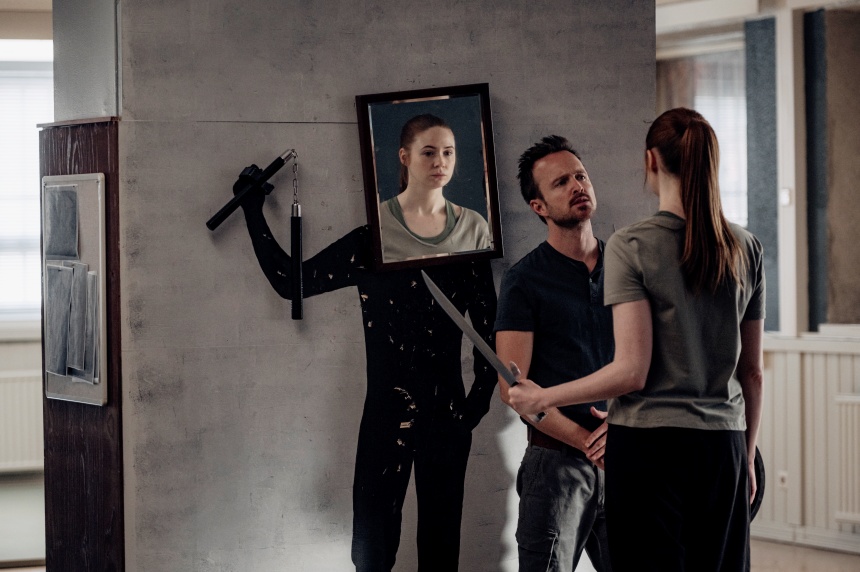Dual
⭐⭐⭐⭐
Rating: R
Run Time: 1 hour 35 minutes
Stars: Karen Gillan, Aaron Paul, Beulah Koale
Writer/Director: Riley Stearns
The best science fiction movies don’t require space ships or robots. All you need is a provocative vision enlivened by an artful script and a talented cast utterly committed to the endeavor.
For Fahrenheit 451, Ray Bradbury made do with Oskar Werner and a fire truck. For Eternal Sunshine of the Spotless Mind, Charlie Kaufman enlisted Jim Carrey and an oversized beauty parlor hair dryer.
In Dual, writer/director Riley Stearns pulls off his disorienting sci-fi marvel with nothing more than a bare doctor’s office, an empty football field, and a lead actor who splits her screen time between two distinct — yet irretrievably similar — characters.
Karen Gillan (Guardians of the Galaxy’s Nebula) stars as Sarah, a perpetually sad young woman stuck in a steadily cooling relationship with her live-in boyfriend Peter (Hawaii Five-0’s Beulah Koale) and estranged from her emotionally distant mother (Finnish star Maija Paunio).
When first we meet Sarah one morning, she is vomiting copious amounts of blood onto her pillow. She responds to this alarming development by calmly removing the sheets, throwing them in the washing machine, and heading down to the local clinic where she tells the receptionist it’s not an emergency.
But Sarah’s oddly low-key attitude is not hers alone. A doctor explains matter-of-factly she has an extremely rare fatal condition, and most likely has only a few months to live. Then, without missing a beat, she proceeds to discuss the relative benefits of burial and cremation. Also, she counsels, because Sarah has surviving loved ones, she may want to take advantage of a new procedure that can create a perfect clone to take her place when she’s gone. She hands Sarah a pamphlet.
“Why am I not crying?” Sarah muses out loud. We wonder the same thing — but soon it becomes clear that writer/director Stearns has created a future where monotones speak volumes and people trudge through life asking no serious questions, making life-shaking decisions on the fly.
Of course, Sarah decides to partake in this new cloning process at a place called “The Facility,” which decor-wise is barely one step above the dark-paneled strip mall office where Tom Wilkinson erased Jim Carrey’s bad memories in Eternal Sunshine.
Another film would at this point put Sarah under a humming cyclotron with flashing lights; instead, a technician simply hands her a tube to spit into, 23andMe-style. Twenty minutes later, Sarah is face-to-face with her perfect double. In fact, that’s her official name: Sarah’s Double.
Sarah’s Double goes home with Sarah to learn how to be the new Sarah when old Sarah is dead. But Sarah’s Double, marginally more vivacious and seemingly more compassionate than the original, does her job all too well: In short order she becomes Peter’s preferred lover and Sarah’s mother’s favorite daughter.
Then the unthinkable happens: Sarah recovers from her rare, incurable illness. Worse, under the rules set by the government, only one of the Sarahs is allowed to survive. A date is set, one year hence, when the two will face off in a duel to the death.
From here the focus shifts to the original Sarah. She begins taking self-defense lessons from a trainer named Trent (Breaking Bad’s Aaron Paul), who specializes in helping originals prepare for their double D-day (apparently, these face-offs are not all that rare).
Gillan is miraculous in her dual role, tweezing out uber-subtle differences despite the film’s requirement of persistent deadpan delivery. A slightly crooked smile, an almost imperceptible variation in inflection, the hint of an insecure slouch are all she employs to clearly define each woman.
With its preposterous premise and defiantly mannered performances, Dual never asks us to imagine ourselves in its somber, twisted world. The script is strictly schematic with undefined fatal illnesses, cloning without technology, unexplained government-mandated death sentences.
Yet despite its low burn, Dual has a lot to say about the comfortable numbness of today’s world, and how in the end we are the products of the lives we build for ourselves—whether we’re Sarah or Sarah’s Double.
Featured image: scene from Dual (RLJE Films)
Become a Saturday Evening Post member and enjoy unlimited access. Subscribe now



